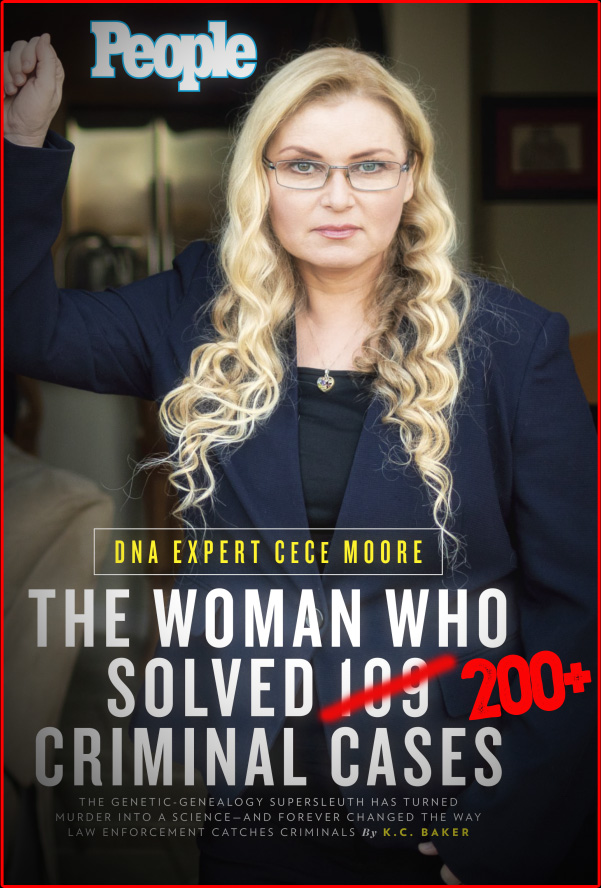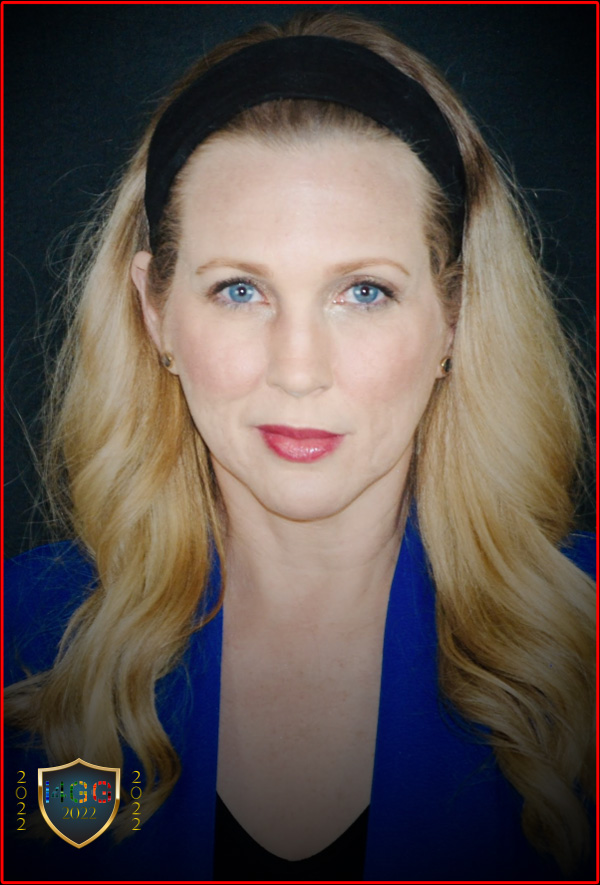Speakers


CeCe Moore is the co-founder of I4GG. She is a pioneer and leading authority on investigative genetic genealogy (IGG). As the Chief Genetic Genealogist at Parabon Nanolabs, CeCe has led her small genetic genealogy team to the unparalleled record of over 200 successful identifications of violent criminals and unidentified decedents, averaging more than one solved case per week over the last four years. CeCe’s work with law enforcement has led to the first conviction, the first conviction through jury verdict, and the first exoneration in cases where the suspect was identified through IGG. Recently profiled by the New Yorker, the New York Times Magazine and the UK Sunday Times, CeCe’s groundbreaking work has been featured widely in thousands of articles and hundreds of television shows throughout the world, promoting public awareness and support of investigative genetic genealogy as a powerful tool with positive societal impact. CeCe is the founder of the DNA Detectives and has been the DNA expert for the PBS Television series Finding Your Roots with Henry Louis Gates, Jr. since 2013. She is a Non-Resident Fellow of the Du Bois Research Institute at Harvard’s Hutchins Center.
Three different subjects
Best Practices in the Field of Investigative Genetic Genealogy
Two Investigative Genealogy Case Studies


Margaret Press, PhD is the CEO and co-founder of the DNA Doe Project, a non-profit, all-volunteer organization dedicated to identifying John and Jane Does through investigative genetic genealogy. The organization raises funds to cover lab costs when agencies cannot afford them, and genealogy research is done pro bono. Since its inception in 2017, DDP has identified over 75 victims where other efforts had failed. Margaret grew up in Los Angeles where she earned her doctorate in linguistics at UCLA. While working at software companies in the Boston area, she published true crime, mysteries and short stories set in Salem, Massachusetts. She currently lives in Sebastopol, California. Surrounded by vineyards, grandchildren, and family trees taped to her walls, she struggles with the concept of retirement.
Title: Bringing Them Home: Five Years in the IGG Trenches.
There are 50,000 or more John and Jane Does in the US alone, many with the potential to have their names restored through Investigative Genetic Genealogy. For the past 5 years the DNA Doe Project (DDP) has been doing just that. We’ll share some of the intriguing cases we’ve solved. We’ll also share lessons learned and the unique challenges of doing forensic work, particularly with degraded DNA samples and questionable matches. From identifications of remains over a hundred years old, teasing out matches from only 3 cells, DDP has been writing the manual as we go along.


Using DNA and Genealogical evidence, Bonnie Bossert, MBA/MHA is perhaps most renowned for her collaboration with Arizona Republic reporter, John D’Anna solving the 87 year old mystery of the Hatbox Baby. The Hatbox Baby mystery first captured the nation’s attention when she was found abandoned in a hatbox on Christmas Eve of 1931 in the Arizona desert. Since then, her fascinating story has been featured in the news nationwide, as well as on the popular “Unsolved Mysteries” television show.
Sharing her genetic genealogy skills, Bonnie also teaches “DNA Kindergarten” for genealogy enthusiasts and lectures on a variety of genealogy topics focusing on DNA.
Title: Solving the 87-year-old mystery of the Hatbox Baby
Solving the parentage of the Hatbox Baby was a labor of love, with many mistakes and lessons along the way. You can spend many hours researching, learning the tools, and practicing the skills needed to be successful in solving DNA mysteries and documenting and sharing your findings. This presentation chronicles my journey and provides insight into the genetic genealogy learning experience that you can apply to your own efforts.


Tim Janzen, M.D. is the co-founder of the Institute for Genetic Genealogy (I4GG), a 45-year veteran of genealogical research in general, and a 16-year veteran of genetic genealogy research in particular. Doctor Janzen’s expertise in genetic genealogy is particularly strong in the areas of phasing and autosomal DNA analysis. He has been a consultant to the genetics company 23andMe as one of their Ancestry Ambassadors. He has also been a consultant for Family Tree DNA, MyHeritage, and Ancestry.com. In addition, Tim has been involved in Mennonite genealogical research for the past 25 years. His website www.timjanzen.com summarizes many different sources available for Mennonite genealogical research. Tim is married to Rachel Janzen and they have 4 children.
Title: Complex Autosomal DNA and Y Chromosome Case Analyses
This presentation will review two complex cases that Tim Janzen has worked on during the past 2 years in which autosomal DNA and Y chromosome test results were used to solve unknown parentage cases involving people who were born in the 1800s. The case studies will show step by step how the genealogical solution unfolded as both new genealogical and genetic data was discovered.


With a cum laude degree from Harvard University and her analytical savvy being constantly brought into play as a World Champion Bridge player, Kitty Munson Cooper’s success in genetics and genealogy comes as no surprise. Her popular blog blog.kittycooper.com started in 2012 to keep track of her own family’s DNA tests as well as her genealogical research. Today it garners several thousand unique daily visitors. Aside from writing tools for graphing DNA relationships and turning Ahnentafel lists into GEDCOMs, she has helped countless people solve unknown parentage cases with DNA and has blogged about some of the more interesting cases.
Born and raised in New York City, recently widowed, she lives in Lakeside, California (East San Diego County).
Title: What's New at GEDmatch
Auto tree building, relationship calculating, new clustering software and more.


Carol Isbister Rolnick is a professional investigative genetic genealogist with Parabon NanoLabs, and leading researcher in the genetic genealogy community. She specializes in the use of DNA to identify biological families, solve violent crimes and identify John/Jane Does. Since 2018, she has aided in the successful identification of dozens of suspects in violent crimes as well as unidentified human remains, for law enforcement agencies across the US and Canada. Since the very earliest days of genetic genealogy, Carol has helped hundreds of adoptees and others of unknown parentage to find their biological family. In 2015, Carol was part of the team who solved the widely publicized abandoned child case if Paul Fronczak, who later published his story in a highly acclaimed book, “The Foundling” and in 2021 was made into a documentary “The Lost Sons”.
Bitten by the genealogy bug from an early age, she truly found her calling as a genetic genealogist beginning in the very early days of testing. The field satisfies her love of science, big data and an insatiable desire to help solve mysteries.
Title: Perspectives on Hispanic DNA - Tips for Overcoming These Most Challenging Cases
Since the advent of the use of genetic genealogy to identify perpetrators of violent crimes and unknown decedents, only a small percentage have been solved within the Hispanic population group. Professional genetic genealogist, Carol Rolnick, will review those cases in more detail as well as the inherent challenges when working to identify an unknown Hispanic subject. Carol will share her perspective on what it takes to overcome these difficulties, including an IGG case study in which a perpetrator with Mexican-American ancestry was identified in 2021.


Kimberly N. Morgan is a professional genealogist specializing in African American research and genetic genealogy. She is a Lead Genealogist for the PBS television series, “Finding Your Roots”, where she often works closely with Lead Genetic Genealogist CeCe Moore, and a Contract Genealogist for the US Army’s Past Conflict Reparations Branch.
Over the past two decades, Ms. Morgan has worked with clients to include the Smithsonian Channel, the International African American Museum archaeological firms and adopters on a variety of projects.
Title: Finding Your Roots Season 8: DNA Case Studies, Kimberly N. Morgan
Season 8 of the PBS series “Finding Your Roots” featured several Guests with decades-long DNA mysteries and a few DNA surprises. This presentation will explore the DNA analysis and traditional genealogical research utilized to solve those mysteries, and uncover at least one surprise. The case studies to be presented will include Brittany Packnett-Cunningham and Pamela Adlon.”


Dana Leeds is a professional genealogist and esteemed teacher known for her pioneering genetic genealogy process—The Leeds Method. This method sorts matches into color coded groups, often revealing four grandparent lines. Thousands have used the method to identify unknown biological parents.
Dana combines her love of biology, teaching, and genealogy by educating others on how to use their DNA results to solve family mysteries. In 2021, she started working as an investigative genetic genealogist working with unidentified human remains.
Title: One Man, Multiple Names, an Unexpected DNA Discovery.
William Emmitt Hunter arrived in Oklahoma around 1910 in his early to mid-30s. He married and raised eight children, but he apparently never told them about his past. Only DNA could unravel his secrets. This presentation will share the fascinating story of his family as well as the genetic and traditional genealogy methodology that was used to uncover it.